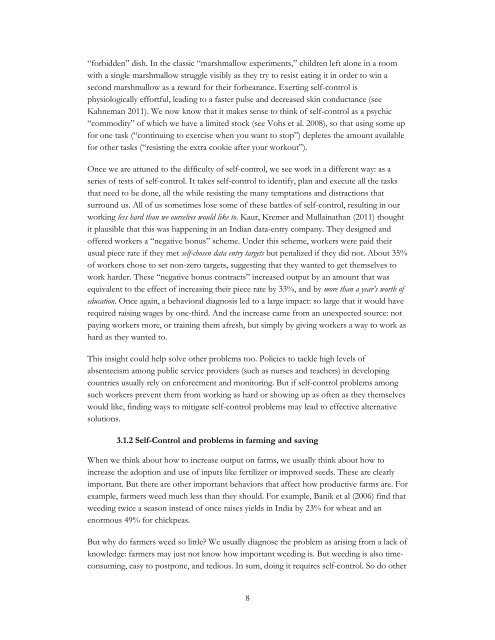1426679 file datta mullainathan behavioral design
1426679 file datta mullainathan behavioral design
1426679 file datta mullainathan behavioral design
You also want an ePaper? Increase the reach of your titles
YUMPU automatically turns print PDFs into web optimized ePapers that Google loves.
“forbidden” dish. In the classic “marshmallow experiments,” children left alone in a room<br />
with a single marshmallow struggle visibly as they try to resist eating it in order to win a<br />
second marshmallow as a reward for their forbearance. Exerting self-control is<br />
physiologically effortful, leading to a faster pulse and decreased skin conductance (see<br />
Kahneman 2011). We now know that it makes sense to think of self-control as a psychic<br />
“commodity” of which we have a limited stock (see Vohs et al. 2008), so that using some up<br />
for one task (“continuing to exercise when you want to stop”) depletes the amount available<br />
for other tasks (“resisting the extra cookie after your workout”).<br />
Once we are attuned to the difficulty of self-control, we see work in a different way: as a<br />
series of tests of self-control. It takes self-control to identify, plan and execute all the tasks<br />
that need to be done, all the while resisting the many temptations and distractions that<br />
surround us. All of us sometimes lose some of these battles of self-control, resulting in our<br />
working less hard than we ourselves would like to. Kaur, Kremer and Mullainathan (2011) thought<br />
it plausible that this was happening in an Indian data-entry company. They <strong>design</strong>ed and<br />
offered workers a “negative bonus” scheme. Under this scheme, workers were paid their<br />
usual piece rate if they met self-chosen data entry targets but penalized if they did not. About 35%<br />
of workers chose to set non-zero targets, suggesting that they wanted to get themselves to<br />
work harder. These “negative bonus contracts” increased output by an amount that was<br />
equivalent to the effect of increasing their piece rate by 33%, and by more than a year’s worth of<br />
education. Once again, a <strong>behavioral</strong> diagnosis led to a large impact: so large that it would have<br />
required raising wages by one-third. And the increase came from an unexpected source: not<br />
paying workers more, or training them afresh, but simply by giving workers a way to work as<br />
hard as they wanted to.<br />
This insight could help solve other problems too. Policies to tackle high levels of<br />
absenteeism among public service providers (such as nurses and teachers) in developing<br />
countries usually rely on enforcement and monitoring. But if self-control problems among<br />
such workers prevent them from working as hard or showing up as often as they themselves<br />
would like, finding ways to mitigate self-control problems may lead to effective alternative<br />
solutions.<br />
3.1.2 Self-Control and problems in farming and saving<br />
When we think about how to increase output on farms, we usually think about how to<br />
increase the adoption and use of inputs like fertilizer or improved seeds. These are clearly<br />
important. But there are other important behaviors that affect how productive farms are. For<br />
example, farmers weed much less than they should. For example, Banik et al (2006) find that<br />
weeding twice a season instead of once raises yields in India by 23% for wheat and an<br />
enormous 49% for chickpeas.<br />
But why do farmers weed so little? We usually diagnose the problem as arising from a lack of<br />
knowledge: farmers may just not know how important weeding is. But weeding is also timeconsuming,<br />
easy to postpone, and tedious. In sum, doing it requires self-control. So do other<br />
8


